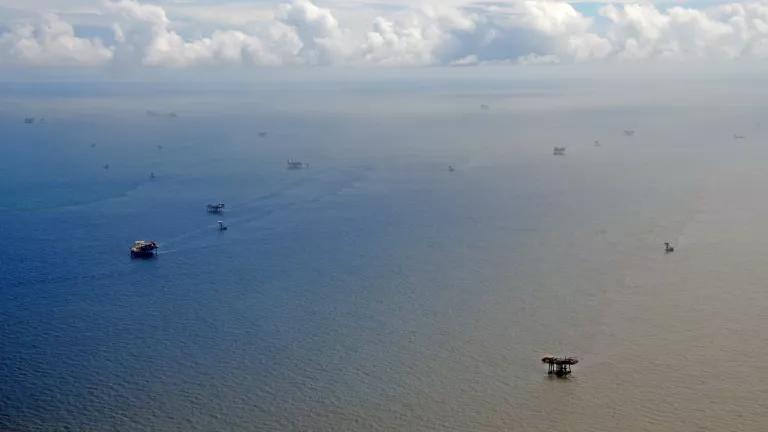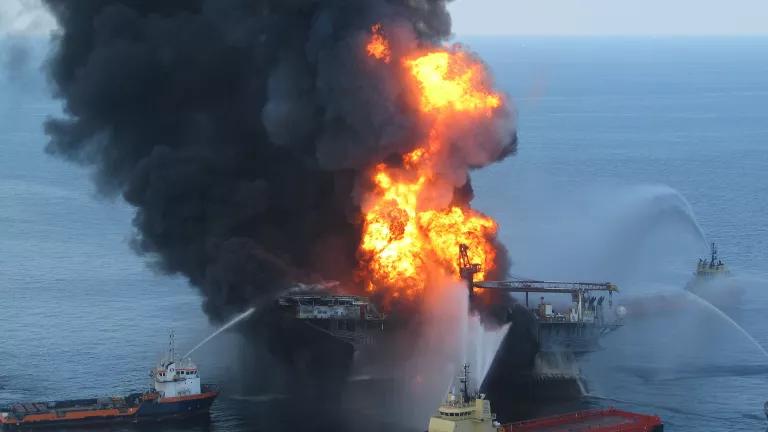Next Steps for Our Ocean Budget
We recently saw approval of ocean funding packages from both the House and Senate Appropriations Committees. While the future funding levels of these bills present a brighter picture than the devastation that would come from the Trump budget, we’re still a ways from securing funding for critical National Oceanic and Atmospheric Administration (NOAA) programs that protect the lives, livelihoods, and way of life for the 124 million people who call our oceans and Great Lakes coasts home.
Our oceans and Great Lakes contribute hundreds of billions of dollars in goods and services to the country’s gross domestic product and employ millions of people. And use of these resources is growing rapidly—from both traditional uses like shipping, fishing, and recreation, and new industries like aquaculture and offshore renewable energy.
The good news is that both the House and Senate bills fund the following programs that Trump’s irresponsible budget marked for elimination:
- The Coastal Zone Management Grants Program, which funds states’ work nationwide to safeguard coastal communities from storms, protect fish and wildlife, and keep beaches open and water clean for tourists and residents to enjoy. State coastal zone managers also make sure proposed offshore industries are in line with state goals.
- The National Estuarine Research Reserve System, designed to protect and study some of the most biologically-productive places on the planet from the Hudson River to San Francisco Bay.
- The Sea Grant Program, which funds coastal researchers at hundreds of our nation’s universities to develop cutting-edge solutions to challenges like reducing the Great Lakes’ nutrient pollution and improving methods for Gulf of Mexico oyster aquaculture.
- The Marine Mammal Commission, an independent agency that for more than 40 years has helped lead marine mammal conservation off our coasts.
The bad news is that far too many cuts remain to our crucial ocean agency. The House’s deep cuts may look good through a lens of “anything is better than nothing,” but only if we’re keeping programs alive to starve them. The reduced amounts don’t actually allow programs to function and we won’t see the benefits we rely on NOAA to provide.
For example, while the House bill includes Coastal Zone Management Grants (a step up from the Administration’s proposed elimination), it recommends a 35% cut from the 2017 budget. Without funding for coastal zone managers, we could see delays in offshore development permitting and less effective oversight and protection of our public coastal and ocean resources. The House budget also recommends eliminating Regional Coastal Resilience Grants (as did the Trump budget). These grants fund important state and local government work on ocean challenges that flow across state lines, like ocean acidification and marine debris. The Senate bill keeps both of these grant lines at the current 2017 levels.
The House bill also reinforces many of the Trump Administration’s unjustified funding cuts to climate research; the Senate bill rejects massive cuts here, instead opting for existing 2017 funding.
Turning a blind eye to climate change won’t make it go away. The more information we have today, the better able we will be to predict future climate and make smart decisions that protect Americans. NOAA’s forecasts and early warnings for natural disasters like hurricanes and tornadoes, and its work to buffer homes and businesses from storms and protect fish and wildlife keep us safe and our economy strong. We need to ensure that the Senate NOAA numbers, which represent the real need, become reality.
NRDC is also on high alert for harmful ocean riders, which are amendments that can negatively impact important policy on an appropriations bill. Riders have been proposed to several appropriations bills that would undermine the work happening under the National Ocean Policy, which improves coordination among the dozens of government agencies that oversee marine health and development. For example, language in the recently passed House “minibus”—a series of appropriations packages cobbled tougher under the heading of “defense” would prevent states from accessing the federal assistance they need to advance best practices on key issues, including offshore wind projects that will power our cities, sand mining to rebuild our beaches, and aquaculture that adds to coastal economies. Riders that take aim at good governance and hinder agreements hammered out over several years by states from Maine to Virginia, regional fisheries managers, tribes, and federal agencies—and with extensive industry and public involvement—won’t help us make better development decisions and have no place in Congress’ final budget bills.
The upshot is that we need to keep up the pressure. Too many people rely on healthy oceans and coasts for Congress to turn its back on funding critical programs or to anchor the funding bills with riders that will run the legislation aground.




